|
|
UNDER CONSTRUCTION - MOVED TO MIDDLEBORO REVIEW AND SO ON https://middlebororeviewandsoon.blogspot.com/
|
|

Our work to defend and elect more pro-choice DAs is more important than ever before. This Thursday at 3 pm ET, we will be hosting a campaign with Organiz to spread the word on Twitter and Facebook about the important role that DAs play to protect abortion rights.
Here’s how to join in on the action:
From 3-5pm ET on Thursday, your tweets and Facebook posts will go out automatically alongside a flood of other messages from across our movement.
We want to see as many people join us in spreading the word about our pro-choice DAs, and giving them the public support they need in this critical moment. Conservatives will be going on the attack against them for the pledge they have taken — so this is the time to show them we have their backs.
While the fight in Congress will move slowly ahead, it is District Attorneys who can protect women from prosecution NOW.
Over 88 DAs have pledged to protect people seeking abortions by choosing not to prosecute — even if abortion is made illegal, including all 24 of our Real Justice PAC-elected DAs.
We need your help to defend our DAs and grow the number of bold leaders who will join them in protecting abortion rights. Joining our action on Thursday and publicly showing your support is one of the most important ways you can do just that.
Take a minute to join us and schedule your own posts by clicking HERE to join our Organiz action.
We can’t wait to read your response and see the wave of support from across our people-powered movement.
— Real Justice
P.S. You can still help even if you don’t have a Facebook or Twitter account. Take a minute to send our microsite to a friend or family member to help them learn more about our DAs refusing to prosecute people for seeking an abortion.

Pol. Adv. Paid for by Real Justice PAC, realjusticepac.org
Not authorized by any federal, state, or local candidate or a committee controlled by a candidate.
Email us: info@realjusticepac.org
Live on the homepage now!
Reader Supported News
The decision to hear Moore v. Harper could lead to an erosion of voting rights and an increasing likelihood of election interference. At issue is a North Carolina Supreme Court case holding that the state’s constitution precludes severe partisan gerrymanders; the argument the petitioners make is that state courts shouldn’t have any role in overruling federal election rules put into place by state legislatures. This so-called independent state legislature theory has found little sympathy from scholars but appears to have garnered more affection from the current slate of conservative justices — four of whom have suggested they are at least willing to entertain the idea. The consequences of such a ruling would be tremendous.
The Republican-appointed Supreme Court majority would complete a nasty bait-and-switch by neutering state courts when it comes to elections: Chief Justice John G. Roberts Jr. wrote in a 5-to-4 decision three years ago that federal courts could do nothing to prevent the same sort of extreme gerrymander. But never fear, he insisted, state courts could step in to protect citizens’ rights. Now, it seems, he and his colleagues on the right, with Justice Amy Coney Barrett a possible swing vote, are poised to go back on that promise. This would mean that state legislatures — their own makeup the result of heavy gerrymandering — could contort congressional districts at will to ensure one party has the advantage, playing with how much every individual’s vote really counts. Other harms abound.
Should the Supreme Court buy into this radical doctrine, governors and other state and local officials responsible for running elections might also end up with their hands tied. That could lead to chaos if legislatures set burdensome rules for voting in federal contests that conflict with less restrictive rules for state contests. It could also create manifold opportunities for mischief of the sort then-President Donald Trump and his allies attempted in 2020: Legislatures might remain restrained from deciding to ignore the popular vote and appoint their own slates of electors after the fact of a lost presidential race, but they could plausibly pass laws ahead of time establishing a process that allows them to do just that.
The reforms to the Electoral Count Act under negotiation on Capitol Hill could go some of the way toward mitigating the danger, and lawmakers should pursue those changes — but any law’s impact will be limited, and this development also risks snarling talks. Our democracy’s path rests mostly with the Supreme Court. If five justices overturn the North Carolina decision, they will know what they are doing, which is writing a recipe for election tampering. They will also know why they are doing it: not because the Constitution demands it, but because they can.
Follow us on facebook and twitter!
PO Box 2043 / Citrus Heights, CA 95611
|
V=
The Larger Donors Have Largely Disappeared
The size of our average donation dropped by one-third last month and that was the ball game. We got 1 thousand dollar donation last month, we normally average 4. For RSN that’s huge.
Is there someone?
Marc Ash
Founder, Reader Supported News
If you would prefer to send a check:
Reader Supported News
PO Box 2043 / Citrus Heights, CA 95611
Follow us on facebook and twitter!
Live on the homepage now!
Reader Supported News
That’s rich. Bezos of all people should know that a major reason prices are rising is hugely profitable corporations like his Amazon have been using inflation as cover to raise price even further.
Last year, corporate profits overall reached a 70-year high. In the fourth quarter, Amazon's profit nearly doubled — and it announced it would raise the price of its popular Prime membership.
Yes, corporations are facing rising costs for everything from materials to labor. But they’re raising their prices even higher than those costs. In a new paper, researchers Mike Konczal and Niko Lusiani of the Roosevelt Institute find that markups — the difference between what corporations pay for labor and materials and the prices they charge their customers — have been rising dramatically.
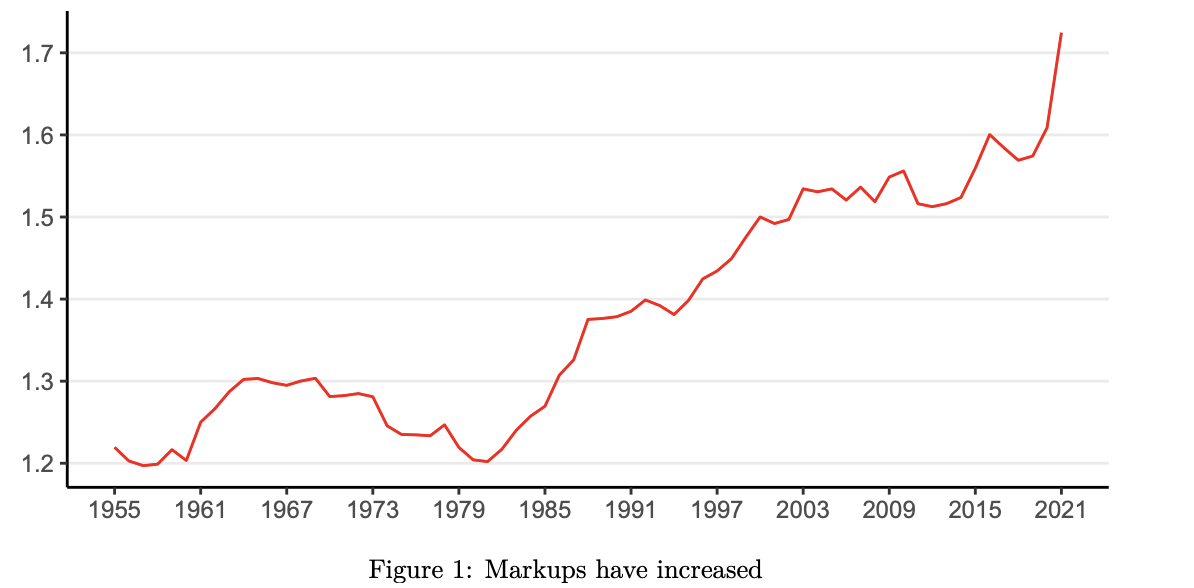
They find the same when they compare corporate costs with their sales.
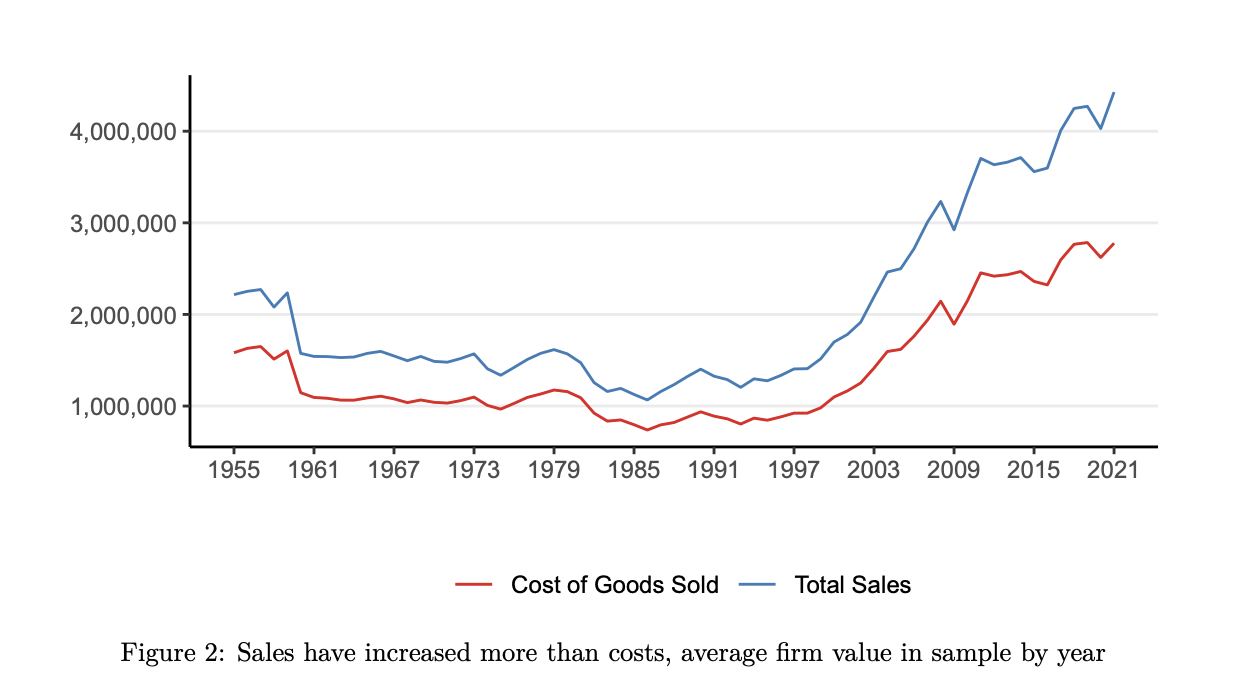
Corporations have been raising their prices because they have market power to do so (two-thirds of all American industries have become more concentrated over the last four decades). And their customers believe the price hikes are justified because the corporations have higher costs.
Let’s be clear. The corporate price hikes have come on top of a worldwide surge in pent-up demand following the worst of the pandemic, global shortages of goods and services seeking to meet that demand, China’s lockdowns, and Putin’s war in Ukraine (which has put upward pressure on energy and food prices).
But the corporate price hikes often exceed these higher costs.
As gas prices at the pump reach their highest point in 14 years, Big Oil is enjoying a gusher. In the first quarter of 2022, Chevron’s profits more than quadrupled from the year before. ExxonMobil’s profits more than doubled. In the past month alone, even though the price of crude oil has fallen approximately $15 a barrel, prices at gas pumps have barely dropped.
Big corporations aren’t pouring these windfall profits back into production. Instead, they’ve embarked on the largest program of stock buybacks in history. ExxonMobil alone plans to buy back $30 billion of stock this year (up from the $10 billion it announced earlier). If it hadn’t been for the buybacks, the stock market would look even worse.
The Fed’s efforts to slow the economy will not remedy these causes of inflation. Hiking interest rates to reduce inflation is like trying to reduce someone’s fever by putting them in a freezer — it doesn’t deal with the cause and may be quite harmful.
Rate hikes increase the costs of borrowing to individuals and consumers, which causes them to cut back on purchases of everything. This, in turn, causes the economy to slow — resulting in higher unemployment. How much higher? Lawrence Summers, Bill Clinton’s Treasury Secretary, says containing inflation will require five years of 6 percent unemployment, or two years of unemployment at 7.5 percent or one year at 10 percent.
The harm inflicted by this alleged cure would be worse than the disease. The first fired (and last hired back) are typically the lowest-skilled and lowest paid.
Other than Fed rate hikes, four moves could help — and the Biden administration should embark on them immediately and loudly:
1. Vigorous antitrust enforcement that reduces the pricing power of big corporations. (Even the threat of such enforcement will make them more reluctant to raise prices.)
2. A windfall profits tax that takes away a portion of their recent profits and redistributes them to consumers (as the Conservative government in Britain is doing on Big Oil).
3. A ban on stock buybacks. Before 1982, the Securities and Exchange Commission viewed buybacks as illegal stock manipulation, and didn’t allow them. The SEC should return to its former position.
4. Publicity. The government should reveal the names of highly profitable corporations that are flagrantly raising prices (not just Big Oil, but a host of other companies ranging from Tyson Foods to Starbucks). This would have an immediate effect. Corporations pay fortunes to burnish their brands.
Mr. President, don’t just tweet that Big Oil should reduce its prices. Initiate an antitrust lawsuit against the major oil companies, threaten a windfall profits tax on them, get your SEC to ban stock buybacks, and name the names of big corporations that are unnecessarily raising prices — not just Exxon-Mobil and Chevron but also Tyson Foods, Starbucks, and Amazon.
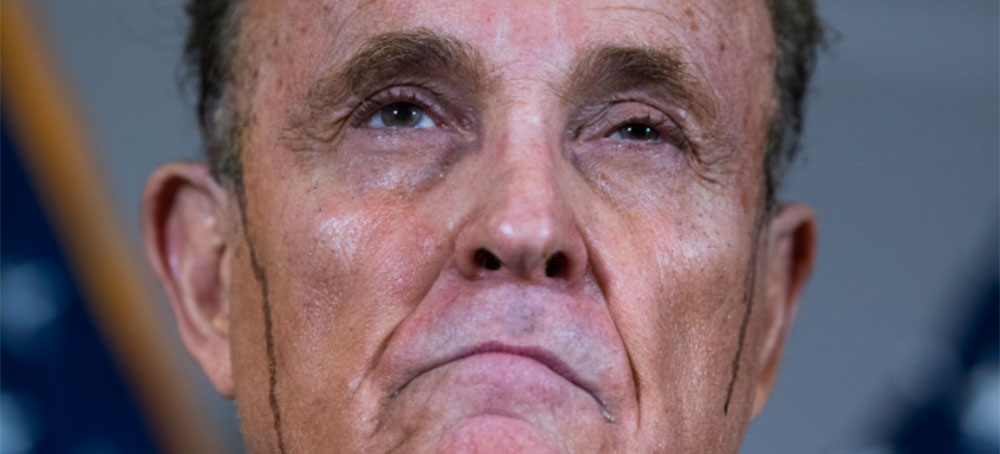 Rudy Giuliani, attorney for former President Donald Trump, conducts a news conference at the Republican National Committee, on lawsuits regarding the outcome of the 2020 presidential election on Thursday, Nov. 19, 2020. (photo: CQ-Roll Call,/Getty Images)
Rudy Giuliani, attorney for former President Donald Trump, conducts a news conference at the Republican National Committee, on lawsuits regarding the outcome of the 2020 presidential election on Thursday, Nov. 19, 2020. (photo: CQ-Roll Call,/Getty Images)
The Fulton County grand jury’s probe appears to be closing in on the former president, who pressured Georgia’s top election official to “find” the votes needed to overturn the 2020 election
John Eastman, Cleta Mitchell, Kenneth Chesbro, and Jenna Ellis — all of which were involved in Trump’s scheme to overturn the election results — also received subpoenas. So too did Sen. Lindsey Graham, as well as Jacki Pick Deason, a right-wing attorney and podcast host.
The Atlanta Journal-Constitution notes that Giuliani testified before Georgia lawmakers three times following the 2020 election, and that the ludicrous, unfounded claims about election fraud during that testimony has drawn the interest of the grand jury. Graham allegedly called Georgia Secretary of State Brad Raffensperger following the 2020 election to ask if he had the power to toss out legally cast absentee votes.
The subpoenas, which were issued on Tuesday, come as the grand jury has been hearing testimony from a “parade” of witnesses, as the Journal-Constitution put it, many of whom have connections to Trump.
Georgia, which narrowly voted for President Biden in the state’s first Democratic turn in decades, has since become a hotbed of election conspiracy theorizing. The close result led Trump and his team to aggressively push officials to reconsider the race, with the former president famously telling Raffensperger to “find” the votes needs to give him the election. Fani Willis — the district attorney of Fulton County, which encompasses most of Atlanta — has been investigation the potential election meddling, and in January received permission to seat a special grand jury to assist with the effort. The grand jury was impaneled in May.
The subpoenas issued on Tuesday indicate that effort is not only heating up, but closing in on the former president.
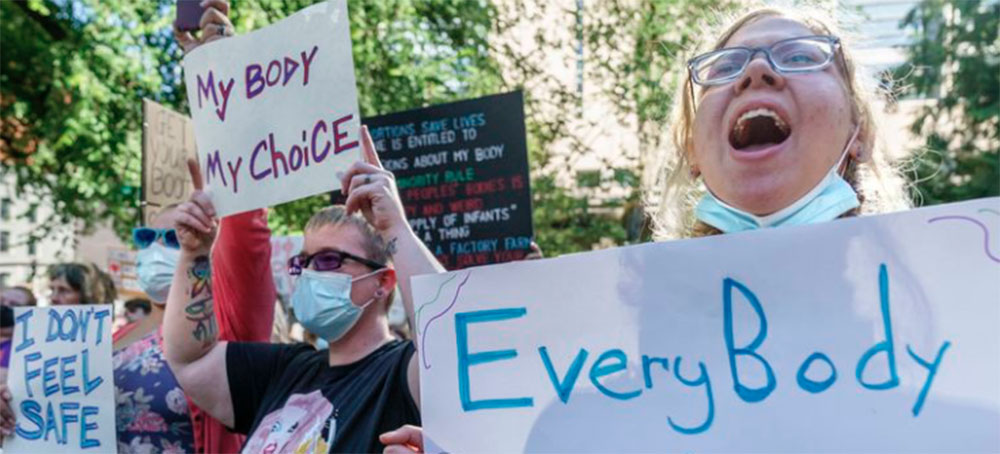 Chloe Latuvnik, 13, of Kenosha, Wisc., right, chants with her mothers Joy and Marianne Latuvnik-Morin, left and center, as they attend a rally in downtown Portland, Ore. where thousands of people gathered on Friday, June 24, 2022, to protest the U.S. Supreme Court's decision to overturn Roe v. Wade. (photo: Kristyna Wentz-Graff/OPB)
Chloe Latuvnik, 13, of Kenosha, Wisc., right, chants with her mothers Joy and Marianne Latuvnik-Morin, left and center, as they attend a rally in downtown Portland, Ore. where thousands of people gathered on Friday, June 24, 2022, to protest the U.S. Supreme Court's decision to overturn Roe v. Wade. (photo: Kristyna Wentz-Graff/OPB)
The rank and file of the so-called pro-life movement is full of people who need reproductive care—even if it means literally leaving a protest outside a clinic to ask for it.
But she wasn’t there to protest—she had an appointment.
“She talked about being in marches, and said she had spent a lot of time volunteering in crisis pregnancy centers—you know, showing patients the ultrasound image and explaining what happens,” Lapedis, a fellow with the group Physicians for Reproductive Health, told The Daily Beast. “She said she had been anti-abortion her whole life, and that her whole family was like her—and yet she was so appreciative of the care she received from us. She literally was like, ‘I’m so grateful that I’m able to make this choice for myself.’”
Lapedis’ experience is remarkable in part because she resides in a state with a looming ban on the procedure after six weeks—though the law has so far been held up in court.
“You sometimes have anti people who are like, ‘Promise me no one’s going to find out, my boss cannot know,’ [because] they work in the Republican legislature or something. Which has happened—but this patient was so appreciative.”
Abortion providers across the country are reeling from the fall of Roe, and some face the prospect of legal reprisal from law enforcement in their own state or even other states where patients need help. Almost inevitably, they are reflecting on the many patients they’ve seen who came in for a service they claimed to fervently oppose—and in some cases actively protested against.
“All of us who do abortions see patients quite regularly who tell us, ‘I’m not pro-choice, but I just can’t continue this pregnancy,’” said Dr. Sarah Prager, a professor of obstetrics and gynecology at the University of Washington. “We’ve even seen people coming into the clinic off the protester lines to get their abortion, then return to protesting outside the clinic.” And to be clear, she added, “These are not people who turn anti-choice after having an abortion, but who simply access this essential service when they need it in spite of their personal beliefs about abortion in general.”
According to Prager, the phenomenon is so common that abortion providers have a name for it: the Me Exception.
“We in the movement often say people believe abortion should be legal in cases of rape, incest and ‘me,’ meaning whatever reason is relevant for that person,” she said. And yet, she noted, of the many surveys describing how Americans view abortion, virtually none reflect that reality.
“Anti-choice people have no incentive to be honest about whether or not they’ve had an abortion, and we as physicians would never leak a story about a patient,” she continued. Doing so is prohibited under the Health Insurance Portability and Accountability Act, or HIPAA, the federal law that protects confidential health information.
Still, health professionals are permitted to discuss cases in general terms, and when asked about patients with anti-choice views this past week, abortion providers had no shortage of sometimes incredible tales about activists deeming themselves an exception to the rule.
Dr. Portia Jones, a family-medicine physician in Washington, recalled the time a woman “whose sister-in-law was the president of a big right-to-life organization” had asked to be “snuck in the back door” of the clinic where she was working in Philadelphia. Then there was “the picketer who brought her daughter in for a procedure and was back on the picket line the next week,” she recalled. On another occasion, a woman came in “and declared to a full waiting room that they were all sinners and should leave immediately,” she said.
“When I drew her aside, I found out she was there for an abortion, too,” Jones told The Daily Beast.
Jones and other abortion providers attributed many such instances to a sense of exceptionalism on the part of patients who decide their situation entitles them to do what they believe other women should—legally—be unable to. “I’ve done a lot of options counseling with patients who had to do some pretty creative moral jujitsu to justify their behavior to themselves,” she added. “But our role is to give people information, to create a space for them where they can make decisions, and to support them in that process.”
While 13 states with so-called trigger laws are poised to be the first to effectively prohibit almost all abortions, roughly two dozen states in total have laws on the books that could be used to sharply restrict the procedure, according to an analysis by the Guttmacher Institute, a research organization that supports abortion rights. The laws are, of course, the product of decades of far-right organizing against reproductive rights, with actions ranging from peaceful protest to the election of anti-choice officials to violent attacks.
But providers said the hypocrisy among the rank and file powering the so-called pro-life movement was glaring.
“I’d say about a third of my patients would reveal in their counseling or during the procedure, you know, ‘I want you to know I’m pro-life, but you understand why this has to be,’” said Dr. Nicholas Gideonse, recalling his work as an abortion provider in rural Oregon. “I think in almost all of those cases, they were making that choice in order to be the best parent that they could be.”
There were certainly those pro-life patients who “stridently insisted that their circumstances were particular and special,” Gideonse added. But there were cases, too, of pro-life patients who came to him seeking compassion.
“I’m remembering a soft-spoken younger woman who felt that I, because I had delivered her other unplanned pregnancy, understood how pro-life she really was and that for this reason I was the person who could perform the procedure she needed now,” he said.
Rather than a one-off, stories about anti-choice activists literally coming off the protest line to seek care were rife. That phenomenon may fade in states where clinics are shutting in the face of legal threats, but providers were confident hardcore activists will continue to seek their care.
Several years ago, Dr. Meera Shah, chief medical officer of Planned Parenthood Hudson Peconic in New York, provided abortion care to one of the protesters regularly outside of her clinic.
“I treated her with compassion and kindness just like I do everyone, knowing that people come to us with their own lived experiences,” she said. “I don’t know what this person was exposed to, or what her community is like—it may be unsafe for folks to express an alternative view [about] abortion in their communities or their families. But I do know that nobody anticipates this. Nobody thinks they’re going to be in that situation. You can have these fixed beliefs around something that you think will never impact you, and then when you’re in the moment, your thoughts around it can change, and that’s very much the case with abortion. We see it all the time.”
In her book, You’re the Only One I’ve Ever Told, Shah explored the everyday reality of abortion care that mainstream political dialogue mostly fails to capture.
“I think that the anti-abortion movement comes at it with very strong preconceived notions,” she said. “Their lived experience has taught them that abortion is bad, so they just run with that. But what they fail to do is keep an open mind and express empathy for those who are going through it. And that’s what got us here.”
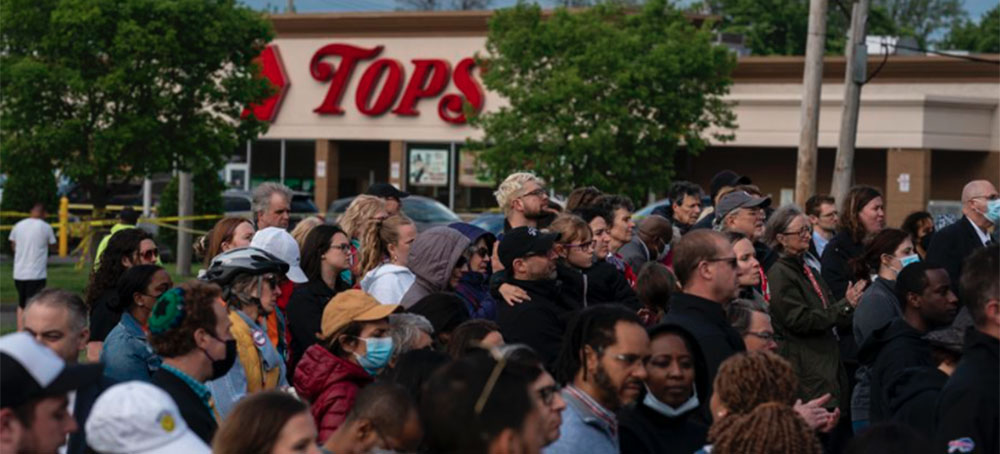 People attend a vigil across the street from Tops Friendly Market at Jefferson Avenue and Riley Street on May 17, 2022, in Buffalo, New York. (photo: Kent Nishimura/Los Angeles Times via Getty Images)
People attend a vigil across the street from Tops Friendly Market at Jefferson Avenue and Riley Street on May 17, 2022, in Buffalo, New York. (photo: Kent Nishimura/Los Angeles Times via Getty Images)
With Tops supermarket set to reopen soon, progressive activist India Walton says, “Buffalo is back to business as usual.”
On May 14, an 18-year-old gunman entered Tops supermarket in East Buffalo, where he shot 10 people dead and injured three others. Beforehand, he left behind a document where he outlined his plan to “kill as many Black people as possible,” motivated by a racist idea known as replacement theory.
While political leaders expressed outrage that white supremacy continues to inspire such terror, Buffalo residents expressed fear — fear that the city would be back to “normal” once the outrage subsided and the news cameras left.
The massacre highlighted Buffalo’s deep structural inequality that allowed the massacre to take place, patterns that already played out in residential segregation, poverty, food insecurity, lead poisoning, and more.
Seven weeks have passed since the massacre, and national attention has indeed turned away. Just 10 days after the mass shooting, a gunman shot and killed 19 children and two teachers at an elementary school in Uvalde, Texas.
I talked to nurse and progressive activist India Walton, who ran for Buffalo mayor in 2021 and defeated incumbent Mayor Byron Brown in the Democratic primary, about where the city and its Black residents stand. The former mayoral candidate says that — as residents feared — the city is “back to business as usual” as Tops readies to reopen in July. Our conversation has been edited for length and clarity.
Fabiola Cineas: It’s been over a month since a white supremacist went into Tops supermarket and killed 10 Black people and injured several others. Lawmakers popped in to say their condolences and rushed to pass legislation, and the national news media seems to have looked away. What is top of mind for you right now?
India Walton: I hate that I’m pessimistic, but Buffalo is so status quo. The first thing I said when it happened was I want to see what happens when the cameras leave. I said that the people who were on NBC and CNN doing national media expressing outrage and denouncing white supremacy were the same people who likely never stepped foot in Tops on Jefferson.
The conditions on the East Side of Buffalo have been as they are for decades.
[That] an 18-year-old child — I say “child” because I’m a nurse, and I know that the human brain is not fully formed at that age, especially in the male body — was able to Google where he could find a deep concentration of Black folks, the most vulnerable Black folks, our elders, speaks to the fact that this neighborhood is overpoliced yet underprotected.
I’m exhausted. Now our elected officials are talking about whether to call it the East Side or East Buffalo — and no one gives a fuck! Can we begin to tackle the problem of concentrated poverty and disadvantage? The problem of systemically locking people out from employment, homeownership, and business loans?
Buffalo is back to business as usual. The haves are going to have and the have-nots are going to continue to not have.
Fabiola Cineas: Who is being left out of the narrative that’s being created in the aftermath of the tragedy?
India Walton: The focus of a lot of the energy of media coverage has been on the families of the deceased, and my heart bleeds for them. But there are people who were in that store who were working. There were children outside playing who saw dead bodies in the parking lot. And where’s the help for them?
There’s a young man who was waiting for his friend to get off work. He works at McDonald’s. He doesn’t get to take time off.
There are people who are questioning whether they left the store too early. Whether they turned their back on someone and should have gone back to help. There’s a woman who had the hot barrel of that gun pressed to her scalp and has burns from it. There’s very little assistance for those folks.
Already, we’re talking about the store reopening and the community has not been meaningfully engaged about what that process looks like. Decisions have been made for them as usual. My frustration is just if nothing changes, nothing changes. You could say all the words you want. Let me see some investment. Not only announcing a pot of money, but let me see what the plan is. Don’t make a plan without engaging the people who live there and already know what they need.
Fabiola Cineas: I want to get your thoughts on some of the specific reactions we’ve heard from national and local lawmakers.
In Buffalo, part of Mayor Byron Brown’s message was: “We are certainly saddened that someone drove from hundreds of miles away, someone not from this community, that did not know this community, that came here to take as many Black lives as possible, who did this in a willful, premeditated fashion, planning this.”
Gov. Kathy Hochul passed a body armor law that wouldn’t have stopped the gunman and rushed to strengthen New York state red flag laws that failed to stop the gunman from getting a firearm.
Biden in his visit to Buffalo denounced white supremacy but didn’t exactly identify steps to address systemic racism. How do these responses sit with you?
India Walton: Politics is such that those who have the microphone control the narrative. I knew very early on that they’d try to focus on the fact that this person isn’t from here. But I’ve lived in Buffalo my entire life. About 75 to 80 percent of Black people live on the East Side. It’s not by chance. It is by design. The policy of demolishing blighted properties, of disinvestment in neighborhoods on the East Side, didn’t happen overnight. All of these conditions that were created happened in Byron Brown’s tenure. The recovery from this incident is going to be longer and more difficult because of the conditions that have been created by policy at the local and state level.
Cuomo’s Buffalo Billion built up a medical campus, a Tesla factory that doesn’t employ very many people, and got us canalside. Meanwhile, we still have a severe shortage of truly affordable housing. Our rates of Black homeownership are some of the worst in the country. The housing stock is some of the worst in the country. Kathy Hochul had the audacity to announce $60 million for the Central Terminal when in that same neighborhood there are houses for much less money where we can get the lead problem abated.
We have a serious childhood lead poisoning issue in the city of Buffalo and Erie County. We prefer flashy Band-Aid solutions that sound good in the media, and we’re only covering gushing wounds. No one is doing anything to stop the bleeding.
There’s no true comprehensive plan to redevelop the East Side. And when we’re talking about denouncing white supremacy, that doesn’t only mean denouncing overt forms of racism but it also means changing the kind of restrictive banking and financial policies that hold entire communities back. We have a local nonprofit that had to start a ride share because people in that neighborhood don’t have access to a grocery store or pharmacy, a post office.
Fabiola Cineas: Yeah, I read that following the massacre, Tops set up a shuttle to transport residents to another neighborhood for groceries. The story I read described how residents felt uncomfortable because they got stares when they were in the other store. Have you seen the shuttle or talked with anyone who has had this experience? And what are your thoughts more broadly on the fact that Black people have to be bused to a white neighborhood for groceries in 2022?
India Walton: I saw the shuttle stops. I didn’t get on the shuttle. But it must be unnerving for people. First of all, someone went into your neighborhood grocery store and shot a bunch of people down. It will be difficult to go to the grocery store in the first place. And to then have to be dependent upon a stranger to take you somewhere where you’re unfamiliar. It must be really traumatic, but what can you really do about it? People have to eat.
Fabiola Cineas: Local groups have also spearheaded efforts to create food boxes of fresh fruits and vegetables to give away and other items to encourage people to grow it on their own right now. It seems like this is in response to the massacre but also speaks to a bigger chronic issue of food insecurity in which we see grassroots movements stepping in with solutions and not the city government.
India Walton: Right. The interesting thing is that the reason why the response happened so quickly was because these things were already in place. It was already a place that didn’t have access to food. There were already food justice advocates in the neighborhood. I’m thinking about Urban Fruits and Veggies, the African Heritage Food Co-op, and Freedom Gardens. These people were already working independently of any assistance from the city.
Alexander Wright has been trying to open a brick-and-mortar food cooperative in the Fruit Belt neighborhood, adjacent to where the shooting took place, for five or six years. These are people who have already been doing this work, and the racist massacre just shined a light on what was already happening — not only on what the problems were, but that there were already people activated to provide viable solutions. And if we had supported that to begin with, maybe it wouldn’t have been this way. At the very least, folks would have still been able to access food.
I’m of the mind that in order to have a self-determined and liberated autonomous community, charity is not the thing. Charity comes and goes with the whims of funders, philanthropists, and well-meaning do-gooders. But how do we create systems? How do we improve systems? How do we make sure that these investments are made and that they are sustainable and that the community is actually in control of the resources for themselves, so that we’re not waiting for someone to come save us when something like this happens?
Fabiola Cineas: There seems to be this pervasive feeling from Black residents that things would get worse once the cameras left. But it sounds like self-reliance and the community coming together in whatever ways it can has played a role in helping people make it through this tough time.
India Walton: Yeah. I think that, all of the other complexities and issues aside, I am very proud of the way our community responded. Despite the fact that there was all this national attention on it, what I felt and what I still know is that the people who are doing the hard work are folks that are from here. They are people who are doing things with their personal money. There are organizations that are already struggling with limited budgets and staff.
The response from the community and from our community-based organizations and individuals has been incredible. We’ve been checking on one another, because it’s been hard. It’s very, very difficult, especially being one of the handful of people that people turn to for answers. There are many of us in this community who are the problem-solvers, the noisemakers, the activists and advocates of this community. And what we’re up against is being the people who want to help but who don’t always have the resources or the decision-making power. I have to tell people, I’ll do what I can, but a lot of this is not up to me.
Fabiola Cineas: You mentioned how the gunman was able to just look up a zip code based on racial makeup, and was motivated by his mission to kill as many Black people as possible. About 80 percent of Buffalo’s Black residents live on the East Side. In light of this and how you’ve seen the community impacted over the past month and a half, what specific housing policies would be most effective to help Buffalo’s Black residents and to break up the city’s extreme segregation?
India Walton: I co-founded a community land trust that started in the Fruit Belt neighborhood, and before I exited my position as executive director, the membership voted to make it into a citywide thing. A citywide land trust that is municipally supported could provide permanently affordable housing for homeownership so people can live wherever they want in the city. The city of Buffalo is the largest property realtor in the city. There are more than 1,000 vacant parcels of land that could be built on the East Side and in other parts of the city. There are vacant homes that can be sold for little or nothing to people to be rehabbed and lived in and put them back on the tax roll.
I had a very well-researched and comprehensive plan for development and increasing homeownership in closing the racial wealth gap. I don’t have any insight into what’s happening now. But, as it stands, there hasn’t been a public plan to change anything like that. The governor gave $600 million to trillionaires to build a football stadium. I was riding through the East Side yesterday and there are city-owned lots [where] the grass was up to my waist. They just don’t cut it. They just don’t care. There’s, like, no trash cans. People litter because they don’t have anywhere to dispose of trash. Simple things like that — there’s just no thought being put into providing and carrying forward our community in the way that it deserves.
Fabiola Cineas: I keep thinking about what you said about the people who were not killed in the massacre but got caught up in it, whether their life was spared or they witnessed something because they were close by. How should the city be trying to help them?
India Walton: I think that I’m not the person to have that answer. They are. They all have individual and unique needs. They should be engaged on an individual basis. I think that one thing that has to happen is that there needs to be widespread access to mental health services.
And it needs to be in a way that the delivery is personalized and that we’re not expecting a person to necessarily leave their house to go get it. Because there are some people who are afraid to leave the house. If we can get them telehealth visits, that could possibly be helpful.
It brings up so many other issues, with every layer we pull back. Even if we were to offer a person telehealth visits, do they have internet or a computer in their house? We assume that everyone has a smartphone but they don’t. This is a neighborhood that was already in a position of economic insecurity and precarity.
There was a young man at Tops who was a McDonald’s worker. He should have gotten some paid time off. I worked at McDonald’s, and I don’t know how much things have changed in the last 20 years, but I didn’t have health care when I worked there . Even if this young man wanted to go seek help, can he? Aside from that, he’s already working a job that is probably not paying a living wage. And now, to deal with trauma on top of living the daily trauma of being a working-class Black person. What do you do for folks like that?
Fabiola Cineas: And with Tops reopening this summer, why do you think there hasn’t been a wider effort to engage the community on the store’s future?
India Walton: You know, I don’t know. This is how things are done. The corporation decides, and the electeds decide what the narrative is going to be. They say that they have engaged with the community. They choose who the leaders are and steamroll any voices of dissent in the meantime. I hear that there are renovations and “upgrades’’ being made to the store.
Fabiola Cineas: There’s also something particularly devastating about not wanting to shop at a “renovated” place where Black people were massacred but then having no choice because this is the only local supermarket where you can get your food.
India Walton: So many people have no choice. When we talk about peeling back the layers, we can also talk about access to public transit. A third of households in East Buffalo don’t own a vehicle. Buffalo is really a mess. I can say this operating from a place of extreme privilege. I have a car. I have a job. I can go where I want. I can afford Instacart. I don’t even have to go into a store. That is not the same experience of the majority of people who live in this city.
I want people to remember that this is not an isolated tragedy. Racism and white supremacy have created conditions of cyclic disadvantage. It’s not just about guns and it’s not just about access to food or about charity. This is about making real investments in our community that are going to correct and undo the history of harm that has been done to tons of Black people over generations.
 Ben & Jerry's ice-cream delivery truck at factory in Be'er Tuvia, Israel. (photo: Ronen Zvulun/Reuters)
Ben & Jerry's ice-cream delivery truck at factory in Be'er Tuvia, Israel. (photo: Ronen Zvulun/Reuters)
Complaint says Unilever sale of Israeli business to local licensee undermines its values to sell its ice-cream in occupied West Bank
The complaint filed in the US district court in Manhattan said the sale announced on 29 June threatened to undermine the integrity of the Ben & Jerry’s brand, which Ben & Jerry’s board retained independence to protect when Unilever acquired the company in 2000.
An injunction against transferring the business and related trademarks to Avi Zinger, who runs American Quality Products Ltd, was essential to “protect the brand and social integrity Ben & Jerry’s has spent decades building”, the complaint said.
Ben & Jerry’s said its board voted 5-2 to sue, with the two Unilever appointees dissenting.
Unilever did not immediately respond to requests for comment, but has defended Ben & Jerry’s right to advance its socially conscious mission.
Lawyers for Zinger also did not immediately respond to requests for comment. Last week, Zinger settled his own lawsuit against Ben & Jerry’s for refusing to renew his license.
The dispute highlights challenges facing consumer brands taking a stand on Israeli settlements in the occupied West Bank, which most countries consider illegal.
In April 2019, Airbnb reversed a five-month-old decision to stop listing properties in those settlements.
Last July, Ben & Jerry’s said it would end sales in the occupied West Bank and parts of East Jerusalem, and sever its three-decade relationship with Zinger.
Israel condemned the move, and some Jewish groups accused Ben & Jerry’s of antisemitism. Some investors, including at least seven US states, divested their Unilever holdings.
Unilever has more than 400 brands including Dove soap, Hellmann’s mayonnaise, Knorr soup and Vaseline skin lotion.
Ben & Jerry’s was founded in a renovated gas station in 1978 by Ben Cohen and Jerry Greenfield.
No longer involved in Ben & Jerry’s operations, they wrote in the New York Times last July that they supported Israel but opposed its “illegal occupation” of the West Bank.
 Members of the Republican Guard March Band of Ethiopia stand on guard as a ceremony is held to support Ethiopian troops battling rebels in the Amhara region on November 7, 2021 in Addis Ababa, Ethiopia. (photo: Getty Images)
Members of the Republican Guard March Band of Ethiopia stand on guard as a ceremony is held to support Ethiopian troops battling rebels in the Amhara region on November 7, 2021 in Addis Ababa, Ethiopia. (photo: Getty Images)
The growing frequency of violent episodes and a perceived lackadaisical approach by government in addressing the attacks have led to accusations of state complicity.
Protests began in the capital, Addis Ababa, on June 25, before larger demonstrations were held in the cities of Gondar and the Amhara capital, Bahir Dar, through July 1. Protesters denounced the killings and criticised the government’s inability to curb worsening ethnic violence.
“I went to the demonstration because I’m sick of violence against women and children,” said Geremew Habtemariam, a student in Bahir Dar who took part in protests last week. “Being ethnic Amhara is becoming a death sentence in some parts of the country.”
Days after the protests, reports emerged of yet another mass killing of civilians in the country’s Oromia region on Monday.
In the tragedy that triggered the protest, armed men killed hundreds of people two weeks ago in the Gimbi district of Oromia, some 380km west of Addis Ababa. The victims all belonged to the Amhara, Ethiopia’s second-largest ethnic group, and witnesses say killings began in the morning and continued unabated until the rebels left at about 4pm that day.
Weeks later, bereaved father Abdu Ahmed said he remains broken over the loss of his teenage daughters Hayat and Birtukan. “They shot at everyone, even children and the elderly,” he told Al Jazeera over the phone. “What kind of madman targets defenceless girls?”
“I’ve personally lost count of the number of bodies I’ve buried,” Ali Said, a survivor told Al Jazeera. “Many died from gunshots or in the fire, but I’ve discovered bodies that were hacked to death as well.”
‘Red legacy’ vs ‘green legacy’
At a press conference on Thursday, Ethiopian Prime Minister Abiy Ahmed’s spokeswoman Billene Seyoum told reporters that the death toll currently stands at 338 and that fighters from the OLA (Oromo Liberation Army) carried out the massacre. Abiy has also condemned the violence, saying his government had “zero tolerance” for mass killings of civilians.
The OLA rebel group, which has been at war with the federal army since 2019, controls parts of the region but has denied involvement in any civilian attacks. It accused Addis Ababa of deploying rogue former OLA elements to carry out the June 18 killings.
Days after the massacre, a smiling Abiy and dozens of other government officials were at a launch ceremony for the country’s “green legacy” campaign to encourage the planting of trees for environmental purposes. State media outlets and the prime minister himself encouraged social media users to adopt hashtags promoting the campaign.
However, an Amharic language hashtag meaning “red legacy” in reference to the recent bloodshed outperformed it among Ethiopian TikTok and Twitter users for most of last week. Social media users uploaded pictures of themselves carrying placards with the hashtag in solidarity with protesters.
Tedros Tirfe, chairman of the US-based Amhara Association of America group, believes that frustration among Ethiopians and the ethnic Amhara in particular, has peaked.
“Abiy demonstrated his obliviousness to the plight of Amhara early on by deeming the growing Amhara movement a problem,” he told Al Jazeera. “His negligence, incapacity and complicity in these massacres have been denounced by Amharas repeatedly. Youths are protesting demanding for PM Abiy’s resignation and protection for Amharas outside of the Amhara region.”
Also trending in Ethiopian circles was the release of a new single by popular Ethiopian musician Teddy Afro lamenting nationwide killings. The single, which has accumulated at least five million views on YouTube in under two weeks, subtly criticises Ethiopian authorities for their inability to protect civilians around the country.
‘No one came to our aid’
Across Ethiopia, insecurity is a constant.
A civil war, which broke out in the country’s northernmost region of Tigray in November 2020, continues. Fighting is also ongoing in the Oromia and Benishangul-Gumuz states. Elsewhere, there is violence over territorial disputes amid worsening ethnic tensions. In total, about 5.1 million people were displaced across Ethiopia in 2021, a world record for a single year.
Observers say last month’s massacre is among the worst violent episodes in the country in recent memory.
“The United States is gravely concerned by reported killings of civilians in the Amhara community of the Oromia Region of Ethiopia this weekend,” read a statement by US State Department spokesman Ned Price.
Like many of Ethiopia’s 80-plus ethnic groups, the Amhara, approximately a quarter of Ethiopia’s 118 million people, have intermarried and integrated into communities far beyond the frontiers of their region.
But in recent years, mass killings have regularly targeted them in western Ethiopia. More than 50 civilians were slain in similar attacks that took place between February and March 2021. In November 2020, gunmen ambushed and massacred at least 54 civilians after they had assembled at a school compound.
“The administration’s incompetence to protect the security of its own citizens has so far imperilled the lives of thousands of innocent civilians,” Addisu Lashitew, research fellow at the Brookings Institution told Al Jazeera. “Politically, the government has failed to hold officials accountable for this monumental failure to protect the security of civilians. The administration should immediately allow an independent investigation to help bring to justice the perpetrators of this heinous act and their accomplices.”
The growing frequency of such episodes and a perceived lackadaisical approach by the authorities in addressing the issue has led to demonstrators accusing the government of complicity.
Six survivors of the massacre in Gimbi told Al Jazeera that members of a local government force tasked with protecting the area suddenly departed unannounced on either June 16 or 17, leaving residents defenceless. They returned hours after the rampage had ended.
“There is no explanation for why [government soldiers] left,” Ali Said said. “Even if they left, there are other security forces nearby. But no one came to our aid.”
It fuels claims by activists that officials in Oromia cooperate with rebel groups keen on cleansing the region of its ethnic minorities.
“Federal and regional officials and the security apparatus made no effort to stop such attacks and in many cases were complicit in them,” Tedros explained. “In fact, known perpetrators have often been rewarded, given government positions and land.”
Tedros’s Amhara Association of America, which has been documenting the atrocities, published a statement on its website calling for Abiy and the Oromia regional president, Shimelis Abdisa, to resign for “negligence, complicity, and/or direct involvement in the state-sanctioned Amhara Genocide in Ethiopia”.
Such allegations follow previous massacres of civilians. In late 2020, five government officials in Ethiopia’s Benishangul-Gumuz region were arrested and accused of complicity in an attack that left more than 100 people dead.
The Ethiopian government has denied any involvement and insists it is putting perpetrators of violent attacks on trial.
“We have a probe currently under way,” said Fekadu Tsega, Ethiopia’s junior justice minister. “We will update the public when the probe is complete and act on our findings.”
In Amhara, that pledge may not be so reassuring or end the protests.
A recent federal decision to disarm Amhara rebel groups it deemed unruly triggered anti-government protests in May. In response, security forces arrested more than 4,000 demonstrators, journalists and opposition politicians across the Amhara region.
For survivors, there is fear that more attacks may yet come and that there will be no help.
“There’s no point in sending in the military or police after we’ve lost all of our friends and families,” Ali Said said. “I don’t care what the politicians say. Nobody here trusts them anymore.
 A Northern Spotted Owl watches for prey beside a small stream in Muir Woods National Monument north of San Francisco on Sept. 13, 2018. (photo: Getty Images)
A Northern Spotted Owl watches for prey beside a small stream in Muir Woods National Monument north of San Francisco on Sept. 13, 2018. (photo: Getty Images)
Trump administration officials had rolled back protections for the northern spotted owl, gray wolves and other endangered species.
U.S. District Judge Jon Tigar in Northern California eliminated the Trump-era rules even as two wildlife agencies under President Joe Biden are reviewing or rescinding the regulations. The decision restores a range of protections under the Endangered Species Act — including some that date to the 1970s — while the reviews are completed. Environmental groups hailed the decision, which they said sped up needed protections and critical habitat designations for threatened species, including salmon in the Pacific Northwest.
Tigar’s ruling “spoke for species desperately in need of comprehensive federal protections without compromise,” said Kristen Boyles, an attorney for the environmental group Earthjustice. “Threatened and endangered species do not have the luxury of waiting under rules that do not protect them.”
The court ruling comes as two federal agencies — the U.S. Fish and Wildlife Service and National Marine Fisheries Service — review five Endangered Species Act regulations finalized by President Donald Trump’s administration, including critical habitat designations and rules requiring federal agencies to consult with the wildlife or fisheries services before taking actions that could affect threatened or endangered species.
Fish and Wildlife also said it will reinstate the decades-old “blanket rule,” which mandates additional protections for species that are newly classified as threatened. Those protections were removed under Trump.
Critical habitat designations for threatened or endangered species can result in limitations on energy development such as mining or oil drilling that could disturb a vulnerable species, while the consultation rule and a separate rule on the scope of proposed federal actions help determine how far the government may go to protect imperiled species.
Under Trump, officials rolled back protections for the northern spotted owl, gray wolves and other species, actions that Biden has vowed to review. The Biden administration previously moved to reverse Trump’s decision to weaken enforcement of the century-old Migratory Bird Treaty Act, which made it harder to prosecute bird deaths caused by the energy industry.
The bird law reversal was among more than 150 business-friendly actions on the environment that Trump took and Biden wants to reconsider, revise or scrap, including withdrawal last month of a 2020 rule that limited which lands and waters could be designated as places where imperiled animals and plants could receive federal protection.
A spokesman for the Interior Department, which oversees the Fish and Wildlife Service, said Tuesday the agency is reviewing the court ruling.
Fish and Wildlife, along with the marine fisheries service, announced in June 2021 that it was reviewing the Trump-era actions on endangered species. The reviews could take months or years to complete, officials said.
Industry groups and Republicans in Congress have long viewed the Endangered Species Act as an impediment to economic development, and under Trump they successfully lobbied to weaken the law’s regulations. Environmental groups and Democratic-controlled states battled the moves in court, but many of those cases remained unresolved.
Ryan Shannon, a lawyer with the Center for Biological Diversity, another environmental group, said he was “incredibly relieved” that “terrible” Trump-era rules on endangered species were thrown out by the Oakland, California-based Tigar, who was appointed to the federal bench by former President Barack Obama.
“I hope the Biden administration takes this opportunity to strengthen this crucial law, rather than weaken it, in the face of the ongoing extinction crisis,″ Shannon said Tuesday.
Rebecca Riley of the Natural Resources Defense Council said the court ruling “ensures that the previous administration’s ‘extinction package’ will be rolled back.″
She and other advocates called on the Biden administration to ensure the Endangered Species Act “can do its job: preventing the extinction of vulnerable species.”
Follow us on facebook and twitter!
PO Box 2043 / Citrus Heights, CA 95611
LOTS OF POSTS IGNORED BY BLOGGER..... ALL POSTS ARE AVAILABLE ON MIDDLEBORO REVIEW AND SO ON BREAKING: Dems win spe...
